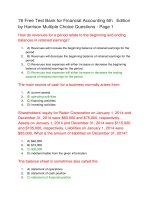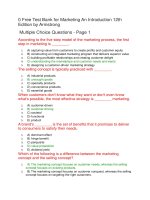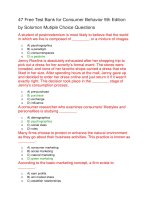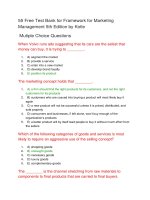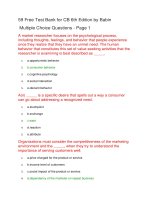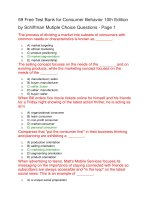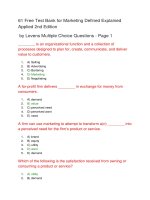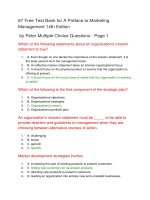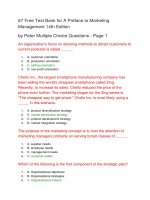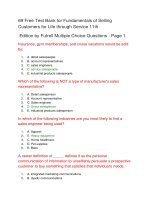76 free test bank for business a changing world 8th
Bạn đang xem bản rút gọn của tài liệu. Xem và tải ngay bản đầy đủ của tài liệu tại đây (52.48 KB, 13 trang )
43 Free Test Bank for Business A Changing World 8th
Edition by Ferrell Multiple Choice Questions
25 Free Test Bank for Business A Changing World 8th Edition by Ferrell True
– False Questions
8 Free Test Bank for Business A Changing World 8th Edition by Ferrell Free
Text Questions
All of the following are associated with the Industrial Revolution
except
1.
2.
3.
4.
5.
A. cotton gins.
B. railroads.
C. farm equipment.
D. computers.
E. assembly lines.
The function concerned with obtaining and managing money and
using it effectively is called
1.
2.
3.
4.
5.
A. management.
B. marketing.
C. finance.
D. production and operations.
E. personnel.
The functions of organizing, staffing, planning, and controlling are
most closely associated with
1.
2.
3.
4.
5.
A. employees.
B. customers.
C. managers.
D. stockholders.
E. accountants.
____ is often called the father of capitalism.
1.
2.
3.
4.
5.
A. Karl Marx
B. George Washington
C. Benjamin Franklin
D. Alan Greenspan
E. Adam Smith.
The American economic system is best described as _______
because the government regulates business to preserve
competition and protect consumers and employees.
1.
2.
3.
4.
5.
A. socialism
B. laissez-faire capitalism
C. modified capitalism
D. communism
E. business ownership
All the following are factors of production used to make goods
and services except
1.
2.
3.
4.
5.
A. natural resources.
B. human resources.
C. customers.
D. capital.
E. financial resources.
Trends have gradually changed the U.S. to a(n) _____ economy
focused on making life easier for busy consumers.
1.
2.
3.
4.
5.
A. manufacturing
B. service
C. agriculture
D. technology
E. marketing
Agricultural commodities are usually sold under which competitive
environment?
1.
2.
3.
4.
5.
A. Monopoly
B. Monopolistic competition
C. Pure competition
D. Oligopoly
E. Modified competition
In a socialist system, citizens are dependent on _________ for
many goods and services.
1.
2.
3.
4.
5.
A. the government
B. the people
C. businesses
D. supply and demand
E. suppliers.
Shelly's business was successful for all of the following reasons
except
1.
2.
3.
4.
A. quality product.
B. appropriate incentives for employees.
C. productive employees.
D. employees who enjoyed being part of a new business.
5.
E. she had no competitors.
When Apple introduced the iPad the price of and demand for
netbooks and notebooks were high. As a result,
1.
2.
3.
4.
5.
A. other suppliers introduced competing products to take advantage of the
demand.
B. consumers stopped buying netpads.
C. manufacturers stopped producing netpads.
D. competition was not allowed to enter the market.
E. the equilibrium price met supply.
When a business fails or does not make a profit, _______ have
the most to lose.
1.
2.
3.
4.
5.
A. customers
B. workers
C. managers
D. owners
E. consumers
The group of people to whom the management activity most
applies is
1.
2.
3.
4.
5.
A. consumers.
B. owners.
C. bankers.
D. government regulators.
E. employees.
In the history of the American economy, the period or stage
following the Industrial Revolution was known for its emphasis on
1.
2.
3.
4.
5.
A. service.
B. technology.
C. manufacturing.
D. agriculture.
E. information.
In a socialist economic system, many people work in ___ jobs.
1.
2.
3.
4.
5.
A. self-employed
B. government
C. high-paying
D. poverty-wage
E. part-time
Economic contraction occurs when
1.
2.
A. spending increases.
B. spending declines.
3.
4.
C. jobs increase.
D. inflation decreases.
All of the following are associated with the manufacturing
economy except
1.
2.
3.
4.
5.
A. buying on credit.
B. marketing.
C. advertising.
D. cable television.
E. marketing research.
The _______ is the price at which the number of products that
businesses are willing to supply equals the number of products
consumers are willing to purchase at a point in time.
1.
2.
3.
4.
5.
A. supply price
B. equilibrium price
C. demand price
D. demand curve
E. exact price
Factors of production are
1.
2.
3.
4.
5.
A. resources used to produce goods and services.
B. fixed resources.
C. taxes.
D. seldom in demand.
E. free.
What is the primary lesson to be learned from the economic
scandals of the early 21st century?
1.
2.
3.
A. Businesses' reputations depend on more than profits
B. Ethical conduct and corporate social responsibility are very important
C. Most businesses can focus on their bottoms lines, to the exclusion of
other factors
4. D. A and B, but not C
5. E. B and C, but not A
When Target has a sale on bed linens,
1.
2.
3.
4.
5.
A. consumers will not demand more than normal.
B. the store will not supply more linens than it normally does.
C. consumers will demand more linens.
D. the manufacturer will halt production.
E. consumers will demand less linens than normal.
Economic expansion occurs when
1.
A. fewer goods and services are produced than consumers demand.
2.
3.
4.
5.
B. an economy is growing and people are spending more money.
C. a nation's standard of living drops quickly.
D. employment levels decline over time.
E. prices begin to rise and incomes begin to fall.
____ resources are also known as labor.
1.
2.
3.
4.
5.
A. Economic
B. Human
C. Productive
D. Financial
E. Natural
Financial resources are also known as _______________.
1.
2.
3.
4.
5.
A. capital
B. labor
C. barter
D. economics
E. exchange
____ relates to the number of goods and services that consumers
are willing to buy at different prices at a specific time.
1.
2.
3.
4.
5.
A. Supply
B. Demand
C. Elasticity
D. Equilibrium
E. Economics
Increased unemployment can reduce consumer demand for
goods and services, leading to
1.
2.
3.
4.
A. economic contraction.
B. inflation.
C. deflation.
D. a budget deficit.
The early economy of the United States was marked by colonists
who operated a society based primarily on
1.
2.
3.
4.
5.
A. manufacturing.
B. technology.
C. sweat shops.
D. information.
E. agriculture.
________________ can be harmful if individuals' incomes do not
increase at the same pace as rising prices because it reduces
their buying power.
1.
2.
3.
4.
5.
A. Deflation
B. Stagflation
C. Inflation
D. Economic expansion
E. Economic contraction
Which of the following functions involves activities designed to
provide goods and services that fulfill needs and desires of
consumers?
1.
2.
3.
4.
5.
A. Accounting
B. Engineering
C. Finance
D. Production
E. Marketing
A budget surplus, when a nation spends less than it takes in from
taxes, is the opposite of a(n)
1.
2.
3.
4.
5.
A. stagnant income.
B. budget deficit.
C. economic expansion.
D. balance of trade.
E. economic contraction.
____ have the most to lose if the business fails to make a profit.
1.
2.
3.
4.
5.
A. Employees
B. Owners
C. Banks
D. Customers
E. Accountants
In a capitalist system, individuals own and operate ____
businesses.
1.
2.
3.
4.
5.
A. no
B. few
C. about half
D. many
E. the majority of
Countries measure the state of their economies to
1.
2.
3.
4.
5.
A. determine whether they are expanding or contracting.
B. regulate wages and employment.
C. let other nations know the state of their economic health.
D. avoid taking corrective action.
E. control government spending.
A continuing rise in prices over a period of time refers to
1.
2.
3.
4.
5.
A. inflation.
B. economic expansion.
C. a recession.
D. economic contraction.
E. stagflation.
The entrepreneur has been primarily associated with willingness
to
1.
2.
3.
4.
5.
A. stay conventional.
B. follow others.
C. take risks.
D. be repetitive.
E. be conservative.
When businesses can promote different features of their products
and consumers are willing to pay more for products containing the
features they desire, the competitive environment is probably
1.
2.
3.
4.
5.
A. pure competition.
B. monopolistic competition.
C. oligopoly.
D. monopoly.
E. pure capitalism.
Advertising, personal selling, coupons, and sweepstakes are
forms of _____.
1.
2.
3.
4.
5.
A. publicity
B. promotion
C. marketing research
D. management activities
E. the marketing mix
_________________ is the study of how resources are
distributed for the production of goods and services within a social
system.
1.
2.
3.
4.
5.
A. Financial resources
B. Human resources
C. Economic system
D. Communism
E. Economics
After demand began to accelerate beyond supply, Mrs. Acres
Homemade Pies was faced with a series of options. Which of the
following is NOT one of those options?
1.
2.
3.
4.
5.
A. Maintain current production levels and raise prices
B. Expand the facility and staff while maintain price
C. Contract the production of pies to a national restaurant chain
D. Maintain current levels of product and reduce the price
E. Increase production and maintain the price
The United States is now considered a service-oriented economy,
with the service industry accounting for an estimated _____
percent of the total U.S. economy.
1.
2.
3.
4.
A. 40
B. 50
C. 70
D. 80
___________ exists when there are many small businesses
selling one standardized product.
1.
2.
3.
4.
5.
A. Monopolistic competition
B. Oligopoly
C. Pure competition
D. Monopoly
E. Market structure
Using the supply and demand curves shown in the graph that
follows, what is the equilibrium price for soft drinks?
1.
2.
3.
4.
5.
A. 35 cents
B. 45 cents
C. 50 cents
D. 55 cents
E. 75 cents
Equal distribution of income and social services is also referred to
as:
1.
2.
3.
4.
5.
A. communism.
B. egalitarianism.
C. capitalism.
D. equality.
E. democracy.
25 Free Test Bank for Business A Changing World 8th
Edition by Ferrell True - False Questions
Economic expansion occurs when an economy is growing and
people are spending more money.
1.
2.
True
False
A product's equilibrium price is constantly changing in response to
changes in economic conditions, availability of resources, and
degree of competition.
1.
2.
True
False
After World War II, the United States became an agricultural
economy.
1.
2.
True
False
Capitalism is an economic system in which the government owns
and operates basic industries while individuals own most other
businesses.
1.
2.
True
False
The primary goal of business activities is profit.
1.
2.
True
False
A severe recession may turn into a depression.
1.
2.
True
False
Profit is what it costs to make and sell a product.
1.
2.
True
False
Monopolistic competition exists when there is only one producer
of a product in a given market.
1.
2.
True
False
Entrepreneurs risk their wealth, time, and effort to develop for
profit an innovative product or way of doing something.
1.
2.
True
False
An oligopoly exists when there are many small businesses selling
one standardized product.
1.
2.
True
False
When a nation takes more from taxes than it spends, it has a
budget deficit.
1.
2.
True
False
The equilibrium price is represented by the point where a
product's supply and demand curves intersect.
1.
2.
True
False
Nonprofit organizations such as Habitat for Humanity do not
engage in management, marketing, or finance activities.
1.
2.
True
False
A central issue of economics is how to fulfill an unlimited demand
for goods and services in a world with limited resources.
1.
2.
True
False
Most socialist nations are democratic.
1.
2.
True
False
Free-market capitalism and laissez-faire capitalism are essentially
the same thing.
1.
2.
True
False
Businesses have the right to keep and use their profits as they
choose, without limitations.
1.
2.
True
False
Demand is the quantity of goods and services that consumers are
willing to buy at different prices at a specific time.
1.
True
2.
False
Advertising first made consumers aware of differences in products
and prices in the marketing economy.
1.
2.
True
False
Products have tangible attributes only.
1.
2.
True
False
The standard of living rises because people have less money to
spend.
1.
2.
True
False
Gross domestic product is the sum of all goods and services
produced in a country during a year.
1.
2.
True
False
The Industrial Revolution brought increasing prosperity and
propelled the United States into a manufacturing economy.
1.
2.
True
False
In a free-market system, the government regulates business.
1.
2.
True
False
Thomas Edison was an American entrepreneur.
1.
2.
True
False
8 Free Test Bank for Business A Changing World 8th
Edition by Ferrell Free Text Questions
What challenges does Shelly face as she considers the three
options?
Answer Given
The first option implies that Shelly's company is not going to grow since its current
size will be maintained by keeping an artificially high price. The second solution
requires Shelly to find the resources to finance the expansion of her activities. The
third option leads Shelly to lose her specific know-how by providing it to the
national restaurant chain. It also implies that Shelly does not own her business
any longer.
Define competition, and describe the different forms it can take
on.
Answer Given
Competition is the rivalry among businesses for consumers' dollars, is another
vital element in free enterprise. Pure competition exists when there are many
small businesses selling one standardized product, such as agricultural
commodities like wheat, corn, and cotton. Monopolistic competition exists when
there are fewer businesses than in a pure-competition environment and the
differences among the goods they sell is small. An oligopoly exists when there are
very few businesses selling a product. In an oligopoly, individual businesses have
control over their products' price because each business supplies a large portion
of the products sold in the marketplace.
What is an economic contraction, and what can it lead to?
Answer Given
Economic contraction occurs when spending declines. Businesses cut back on
production and lay off workers, and the economy as a whole slows down.
Contractions of the economy lead to recession—a decline in production,
employment, and income. Recessions are often characterized by rising levels of
unemployment, which is measured as the percentage of the population that wants
to work but is unable to find jobs.
Explain and demonstrate the relationship between supply and
demand for Mrs. Acres Homemade Pies.
Answer Given
When Shelly Acres started selling her pies, she had to find her own customers.
None of the local restaurants and supermarkets knew her products, so she had to
offer an affordable product to interest restaurants and supermarkets in her
products. As demand increased, Shelly started producing more pies to meet this
demand. At the moment, she cannot supply all the demand. A way to decrease
this demand is to increase prices. She can also increase the production level to
meet the demand.
Define supply, demand, and equilibrium price, and explain their
relationship with each other.
Answer Given
Supply is the quantity of goods or services that businesses are willing to sell at
different prices at a specific time. Demand is the quantity of goods or services that
consumers are willing to buy at different prices at a specific time. Both can be
shown graphically with supply and demand curves. Where the supply and demand
curves intersect is the equilibrium price, the price at which the quantity of products
businesses are willing to supply equals the quantity of products consumers are
willing to buy at a specific point in time. If economic conditions, resource
availability, degree of competition, or some other factor changes either supply or
demand, a new equilibrium price will be established.
Discuss the issues involved in measuring a country's economy.
Answer Given
Countries measure the state of their economies to determine whether they are
expanding or contracting and whether corrective action is necessary to minimize
fluctuations. One commonly used measure is gross domestic product (GDP), the
sum of all goods and services produced in a country during a year. Another
important indicator of a nation's economic health is the relationship between its
spending and income (from taxes).
What would you do in Shelly's position?
Answer Given
Answers will vary, but students should be able to defend the choices they have
made.
What are the three questions that all economic systems must
answer? Who answers them under a communist system? A
socialist system? A capitalist system?
Answer Given
The three economic questions are (1) What goods and services and how much of
each will satisfy the needs of the consumer? (2) How will the goods and services
be produced and who will produce them and with what resources? (3) How are the
goods and services to be distributed to the consumer? Under a true communist
system, these questions are answered by a central government planning
committee. Under a true socialist system, a central government planning
committee answers the questions for basic goods and industries, while the forces
of supply and demand answer them for most other products. Within a capitalist
system, competition, supply, and demand determine the answers.
